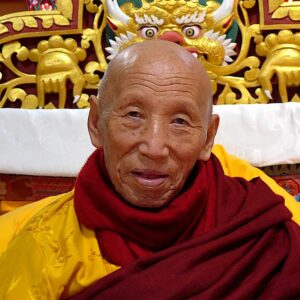Spaciousness
Spaciousness offers an opportunity to rest our minds. Many people find meditation a little intimidating or off-putting. How many times have you heard someone say, “My mind is too jumpy! I just can’t meditate.” Or, they might think that meditation is something for monks, nuns, or a special type of person. But these are all misconceptions. Here, Phakchok Rinpoche discusses how meditation is not such a big deal. It is not so removed from our own experience. As we start out, it is very helpful to keep things simple.
Giving Ourselves a Chance
We can begin with a very ordinary example of a young man thinking about his beautiful girlfriend. If the young man puts his girlfriend’s picture in front of him and thinks about her, he easily focuses on his thoughts. Rinpoche uses this exercise to show people that they can focus their minds more easily than they think. So we need to give ourselves a chance. We may think of other ways in which we naturally and easily rest our minds on one spot.
Creating Space

Sometimes, the simple word “meditation” creates too much pressure when we begin. Instead, if we simply think of “creating space,” it can really make sense. Rinpoche tells here a story about a day when he had a bad mood and was traveling by car. When he looked out the window and saw the sky and space around him, he found himself naturally loosening up with that space. At that time, he didn’t try to think about anything solid. Instead, he just loosely thought about spaciousness, and suddenly, he felt his heart opening. There was a vast feeling of expansiveness, and he relaxed and rested. After only 10-15 minutes or so of this resting, he noticed that his mood had totally changed. He felt happier and satisfied. Because of that, he was able to give a nice talk at his next stop, and people received it happily.
Moods are Not the Boss
Resting in spaciousness is positive and refreshing. And this technique begins the process of mastering the mind. When we try this exercise, we can see how, just like Rinpoche, we can transform our own mood. Our mood is in our own hands. We can step out of our moods and not let them rule our lives. Instead of using the term meditation, Rinpoche reminds us to “create space.” That allows us to relax and let the moods naturally disappear.
On-the job-training
We can apply this spaciousness in daily life wherever we are and no one needs to know. This makes it very useful in busy work situations when we have difficult bosses or many responsibilities. Even in the craziest situations, we usually can find a few minutes. For example, Rinpoche suggests a short bathroom break as a perfect opportunity to practice spaciousness. Create space in privacy for just a few minutes, and no one needs to know! Then you go back to work refreshed, relaxed, and armed with a new perspective. Give it a try instead of a coffee break!










Responses